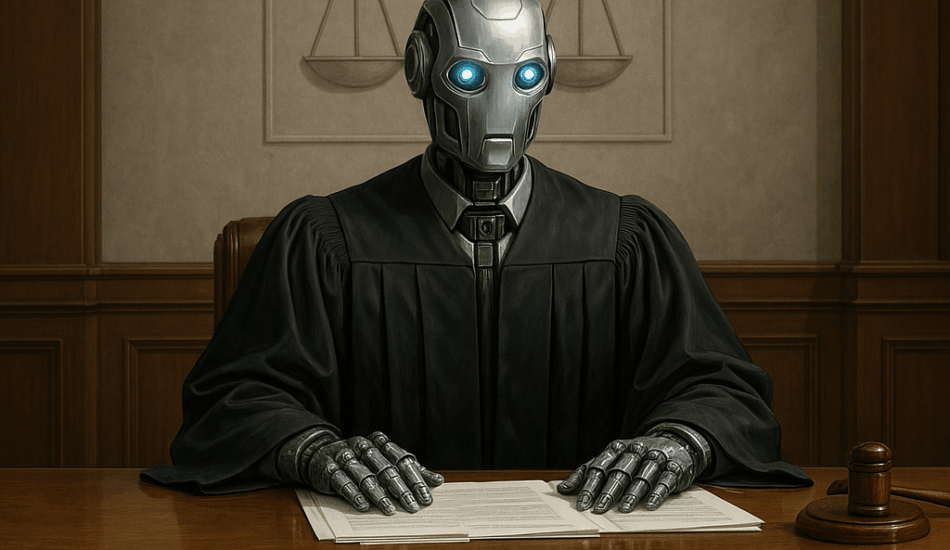When Judges Use AI to Decide Cases

When the Judge Stops Judging: Can AI Replace Judicial Decision-Making?
Attorneys using artificial intelligence to write motions is no longer news. For many, it’s just another tool to manage time, streamline research, and refine legal writing. After all, attorneys are only human. But what happens when that same logic is applied from the bench? What happens when they use AI to carry out their judicial decision making? What if they use it to second guess and override their own decision in their mind, after considering the merits?
What if, in an effort to manage mounting dockets and limited resources, a judge—or a law clerk or staff attorney—uses AI not just to draft, but to decide?
This isn’t a claim that it’s happening now–we just do not know. It’s a recognition of how close we may be to that possibility.
A Future That Feels Uncomfortably Close
Picture a courtroom. Lawyers argue their positions. Witnesses testify. The judge appears to listen and says they’ll issue a written ruling.
But after the hearing, the law clerk compiles the transcript, filings, and case law. Instead of reviewing it line by line, they drop everything into a GPT-based AI model and prompt: “Act as an experienced trial judge. Decide the matter and draft an order.”
The AI delivers. The judge signs.
The lawyers never know that the key act of judgment—the weighing of credibility, law, and fact—was handled by a machine.
Judges Are Only Human. And That’s the Point.
Judges manage crushing caseloads. They do so under intense pressure, often with limited staff and dwindling resources. The work is demanding, and no one can blame a judge for seeking efficiency wherever possible.
In the Tampa Bay area, we are fortunate to regularly appear before judges who take that responsibility seriously—judges who review the law, evaluate arguments, and write rulings that reflect independent thought and careful judgment.
But pressure is pressure. And when a tool like AI offers fast, well-structured drafts—especially when used by a law clerk or staff attorney—the temptation to lean on it more heavily is understandable.
The Problem Isn’t Drafting. It’s Deciding.
There’s a meaningful difference between using AI to assist and using AI to decide.
Judging is more than applying rules. It’s about exercising discretion. It’s about evaluating credibility, sensing nuance, and bringing a human perspective to conflicts that don’t fit neatly into logical templates.
AI doesn’t do that. It synthesizes patterns and generates output. That output may look convincing. It may sound like a judge. But it isn’t judgment.
If we quietly allow AI to cross that line—even through the hands of a law clerk or staff attorney—we risk turning hearings into performances and rulings into simulations.
What Happens If That Line Is Crossed?
This raises difficult legal and ethical questions. If AI plays a significant role in a ruling, should the parties be told? What if a party later learns that the judge didn’t personally evaluate the evidence or draft the ruling? Does it make a difference if the judge says they “adopt” the reasoning in the AI-created judicial order?
Does due process include the right to a decision made by a human being?
Can appellate courts meaningfully review a judgment that was generated by a machine?
There are no clear rules yet. But the questions are coming.
The Human Element Matters
This isn’t about attacking the judiciary. It’s about preserving what makes courts legitimate. It’s about ensuring that decisions carry the weight of human reasoning—not just predictive modeling.
Judges don’t have to be perfect. But they do have to be present.
Artificial intelligence can be a valuable tool. It can summarize. It can structure. It can support. But it should not replace the core function of judging.
Because the day a judge stops judging—truly judging—is the day we risk turning the courtroom into a façade.
About the Author
This article was written by Rocky Brancato, a criminal trial attorney with over 25 years of courtroom experience and the founder of The Brancato Law Firm, P.A. The firm handles major criminal cases throughout Florida, with a particular focus on complex trial litigation, sex crimes, and high-level strategy consulting. Learn more at www.brancatolawfirm.com.



